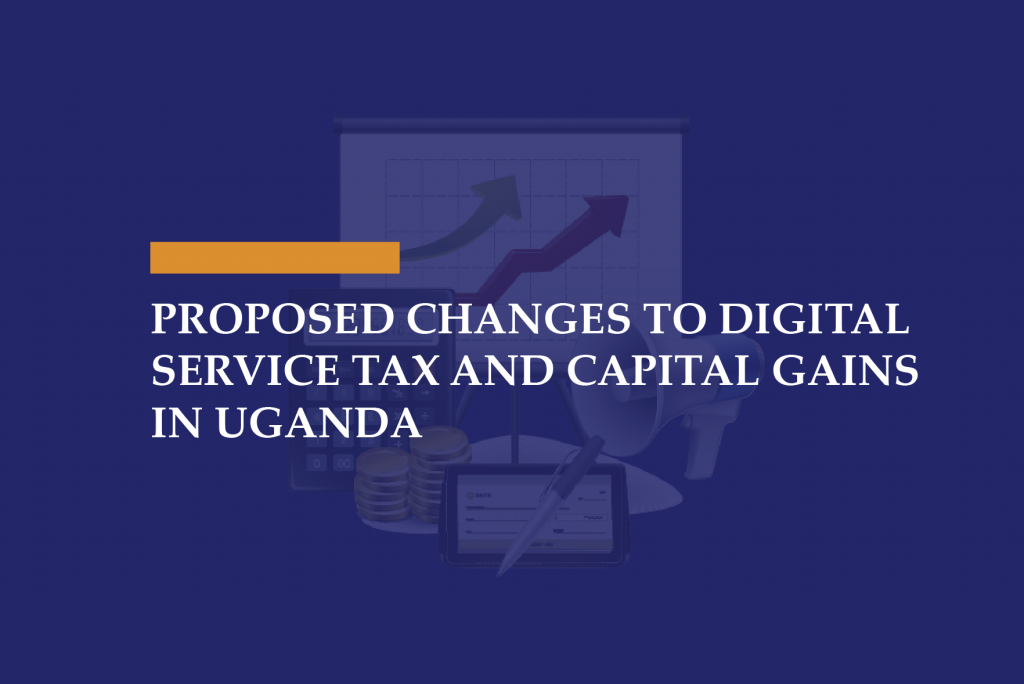Every year, the Ministry of Finance, Planning and Economic Developments comes up with Bills seeking to amend several tax statutes by introducing new taxes. This year is no exception and a number of Bills have already been gazetted. For purposes of this brief, we shall restrict ourselves to the changes being proposed under the Income Tax (Amendment) Bill, 2023.
a.Digital Service Tax
The evolution of the digital economy with advancement in technology has disrupted the traditional way of conducting business. The brick-and-mortar business models required having a physical presence and face to face interaction with customers and largely depended on intermediaries. However, the digital economy enables the conduct of business virtually across countries without the need for establishing a physical presence. Unfortunately, the international tax nexus rules require a physical connection for an entity to be taxed. With the conduct of business online, the big tech companies earn income from different countries, but this income is not taxed since it is earned without maintaining a physical presence in market jurisdictions.
With the wave of digital economy, countries have been attempting to finding a solution by reforming the current tax rules so that income is taxed where it is earned with or without a physical presence. Uganda has been criticized for fearing to impose taxes on the non-resident companies driving the digital economy but rather focusing on consumers of the digital services. this has been due to previous attempts to tax the digital economy, where Uganda instead imposed VAT on companies supplying electronic services and levying Over The Top (OTT) on data for internet use which did not bring the desired effect.
However, in this Bill Uganda has moved to tax companies providing digital services. The Bill seeks to insert Section 86A in the Act to imposed a digital service tax on every non-resident person deriving income from providing digital services in Uganda to a customer in Uganda at a rate of 5%. The tax imposed on a non-resident shall be treated as a final tax. The income is derived from providing a digital service in Uganda to a customer in Uganda, if the digital service is delivered over the internet, electronic network or an online platform. Digital services includes; (a) online advertising services;(b) data services; (c) services delivered through an online market place or intermediation platform, including an accommodation online market place, a vehicle hire online market place and any other transport online market place; (d) digital content services, including accessing and downloading of digital content; (e) online gaming services; (f) cloud computing services; (g) data ware housing; (h) services, other than those services in this subsection, delivered through a social media platform or an internet search engine;
The introduction of digital service tax thus targets foreign companies that derive income from Uganda by providing services through the internet. This means that companies like Google, Facebook, Amazon, Alibaba, Airbnb and Twitter among others, will have to incur 5% on revenue earned from providing digital services such as advertising and sales. The same tax will apply to subscription-based video and audio content providers operating in Uganda such as Netflix, HBO, Disney+, iTunes and Spotify among others. Previously Uganda did not join the rest of the world in implement the OECD “Base Erosion and Profit Shifting” programme (BEPS) that sought to impose a minimum tax on multinational companies in the digital space under Pillar 2.
With the introduction of a digital service tax, Uganda joins a number of countries in the world who have unilaterally imposed a DST on non-residents deriving income from jurisdictions electronically or have proposed to enact Digital Service Tax (DST) to be imposed on MNEs. These include Kenya, Nigeria, Tunisia, Zimbabwe, Egypt and South Africa among others from Africa and some EU member states such as United Kingdom, France, Italy, Austria, Belgium, the Czech Republic, Hungary, Italy, Poland, Slovenia, Spain, Turkey, among others.
The introduction of a digital service tax though belated is intended to broaden the tax base and make these companies to pay taxes on income derived from Uganda even if those companies do not have a physical presence in Uganda.
However, the proposed digital service still has some challenges. Firstly, However, the Bill does not specify the transaction value (income) upon which the 5% shall be levied. Our understanding is that it shall be on gross payments made by persons in Uganda. However, the Bill should differentiate between the transaction value for an entity that provides digital services and an entity that is merely a digital market place. The transaction value for an entity that provides digital services should be the payment received as consideration for the services. However, for a digital marketplace, gross transaction value should be on the commission or fee paid to the digital marketplace provider for the use of the platform. Further considering the implementation of VAT on electronic services, the amount to be charged should be exclusive of VAT.
One of the challenges of taxing the digital economy has been the issue of enforcement. How can Uganda force Alibaba or Amazon to pay taxes in Uganda without such companies having a physical presence here? It thus surprising that the Bill seems has not considered how such tax will be collected from the non-residents. Under the current law, taxes imposed on international payments to non-residents are supposed to be withheld by residents who makes such payments as provided under Section 120 of the Act. Though the Bill provides that the tax liability of the non-resident shall be discharged if the amount due is paid by a withholding tax agent. However, the Bill does not amend Section 120 to include Section 86A on the collection of the digital service tax by withholding tax agents. Further the collection of the tax will remain a challenge where payment is through an intermediary, for example, through use of Visa Cards. If a person in Uganda, buys goods on Amazon, but pays using a Visa Card, who is liable to withhold on payments made; it cant be the Bank which is merely an intermediary. The failure to include Section 86A under Section 120 of the Act can be considered as an oversight but if Parliament does not rectify the anomaly, the law will be on paper without provision for its collection thereby exacerbating further the challenges of taxing the digital economy.
The Bill does not address the issue of location of the user. It merely states the tax is due where digital services are delivered to a customer in Uganda but does not explain the circumstances when a person is deemed to be in Uganda. For example, if a Ugandan is in the United States and bus goods using his VISA Card linked to a Bank Account held in Uganda, does that amount to income being derived from Uganda? The Bill should have included methods for determination of the user location.
The purpose of imposing a DST though well understood as part of increase of revenue seems to have been rushed without proper consultations and considerations. Furthermore, the Bill imposes a Digital Service Tax at a time when the whole world is leaning towards a Unified Approach for taxing the digital economy spearheaded by the OECD. On the African Continent, ATAF published the Suggested Approach intended to act as a guide to African countries who are considering implementing DSTs to avert a potential risk of losing revenue to MNEs in case no global solution is reached in the near future. The ATAF Suggested Approach prescribes a low tax rate ranging from 1% to 3% to be charged on the gross turnover of the Digital services revenue derived by a company or an MNE Group in a chargeable period. The current form of the Bill appears to be contrary to the Suggested Approach and its implementation may not bring about desired results.
It should be noted previous attempts by countries to impose a DST on foreign companies have been met with serious reaction from the United States which is home to majority of Multinational Companies (MNEs). Already investigations are underway in tax jurisdictions that have enacted DSTs. The US was not happy with the DSTs legislations in UK, France and India and immediately launched investigations through the Office of the United States Trade Representative (USTR) to determine whether the DSTs were discriminatory of US companies. The USTR released a report on investigations noting that the DST “undermines progress in the OECD and undermines development of a multilateral approach to digital taxation.” Further that the DST was unreasonable as it was inconsistent with principles of international taxation and restricted U.S. commerce. Due to these investigations France had to postpone collection of their DST. When Kenya imposed a DST, it was blocked from singing a free trade deal with the US partially because of its DST. Therefore, considering the imbalance of power between developed and developing countries, it will not be politically possible to enact and enforce a DST without the cooperation and approval from countries like US and China, which are the leading world economies.
Further to note is that imposing any DST on MNEs will result in double taxation of users as the cost of the tax is passed onto the consumer thereby resulting in double taxation. This is because Ugandans are already incurring excise duty tax on mobile money and Internet Data plus VAT on electronic services. When UK imposed a DST, both Amazon and Google reacted by passing the cost of the tax on to their commercial partners. Amazon increased, by 2%, the amount of the fees that it charges for fulfilling orders from other websites using inventory stores in their fulfilment centres.[1] Google placed a notice on its website stating that from November 1, 2020, a 2% UK DST Fee will be added to the invoice or statement for ads served in the United Kingdom explaining that the fee was driven by the new digital services tax in the UK.
Furthermore, the proposed tax is on every income that non-residents derive from Uganda. However, this is contrary to the ongoing multilateral approaches to tax the digital economy which propose that a non-resident must be making a substantial amount of money before they can be taxed. For example the OECD Unified Approach only targets big companies and the most profitable especially multinationals with global sales. For Uganda to propose to tax every cent made by these non-residents including big MNEs is indeed a big step that doesn’t consider the practical realties and challenges of the digital economy.
From the above, we consider that the proposed Digital Service Tax has been rushed and comes at a time when Uganda took a back seat and refused to participate in the Multilateral Approaches for taxing the digital economy. The proposed tax should be shelved and more consultations are done. Otherwise enacting the DST in the form in which it appears in the Bill might have dire effects on our economy and relations with MNEs and their home countries such as USA and China. As we write this, even our neighbour Kenya which had imposed a DST in 2021, has agreed to abandon the same and pursue the multilateral approaches spearheaded by OECD
b. Imposition of tax on sale of assets and repeal of capital gains
Under the current law, if a person sells property that is not depreciable and that property is used in Business or belongs to a company or a partnership, they are required to include the profit or loss made in calculation of their business income. However, to ensure compliance and efficient collection, a person who buys from a non-resident is required to withhold 10% on the gross amount paid to the non resident and 6% on the amount paid to residents. The above means that under the current law, a person only incurs tax where a profit is made from the sale of such property and if they make a loss, such loss is used to reduce their chargeable income. The profit is made upon the disposal of an asset is calculated by deducting the cost incurred in the acquisition of the asset and this what is known as capital gains.
However, the Bill seeks to repeal the law on treatment of capital gains and rather impose a withholding tax of 5% on the gross amount derived from sale of an asset. In a rather unprecedented move, the Bill repeals all provisions in the Act that relate to the calculation and taxation of capital gains. Instead the Bill seeks to amend Section 118B of the Act and impose a withholding tax on the purchase of an asset. It provides that a person who purchases an asset situated in Uganda shall withhold tax on the gross amount of the payment, at the rate of 5%. It should be noted that this 5% is a final tax in light of the proposed amendment of Section 122 and thus can no longer be used as a credit to be applied in assessing the total business income tax payable.
The Bill introduces a new definition of an asset to mean “a resource with economic value that is expected to provide a future benefit to its holder but does not include trading stock.” Thus the Bill seeks to do away with the imposition of tax only on a business asset.
The definition being proposed by the Bill is ambiguous in so far as it does not define what a resource is and the meaning of an economic value. The definition could be interpreted to mean that a resource with an economic value is something that is scarce and capable of producing cash inflows or reducing cash outflows, directly or indirectly, alone or together with other economic resources. This means that anything whether movable or immovable that has the effect of producing cash is an asset.
Whereas the current law only applies to non-depreciable asset, the Bill does not consider depreciation at all. This means that whether the property has lost value over time, as long it can be sold, taxes must be paid on its disposal. The above flows from the fact that whereas the known principles of capital gains is that a person only pays taxes on the gain derived from the sale, the position under the Bill is that the law doesn’t care anymore whether you have made a loss or a profit. In so far as the Bill is concerned, what’s important is that you sold property and was paid in return.
It should be noted, however, that this proposed law does not apply to— (a) transfer of assets between spouses; (b) a transfer of assets between a former spouse as part of a divorce settlement or bona fide separation agreement; (c) an involuntary disposal of an asset to the extent to which the proceeds of the disposal are reinvested in an asset of a like kind within one year of the disposal; (d) the transmission of an asset forming the estate of the deceased tax payer to a trustee or beneficiary; or (e) the sale of the investment interest of a registered venture capital fund, if at least fifty percent of the proceeds on sale is reinvested within the year of income.
The obligation to withhold tax is on the purchaser. The effect of this new tax is that it will raise the prices of properties particularly land upon sale as the seller will always insist that a purchaser grosses up the 5% , that is that a purchaser pays the tax instead of deducting it from the agreed price. To put it the other way, any sale of property has been indirectly increased by 5% which usually will be borne by the buyer. This tax on sale of assets completely violates all principles governing capital gains. At its best, Government could copy other jurisdictions such as the United States by introducing Capital Gains Tax (CGT) to be calculated separately from business income with a different tax rate by imposing the tax only on the profit made and not on gross.
c. Collective Investment Schemes
The Bill seeks to tax the profit on the contribution paid or credited to a participant of a collective investment scheme. The profit on the contribution is now treated as property income under Section 20 of the Act.
The Bill imposes an obligation on a person who credits or makes payment of a profit on the contribution to a participant of a collective investment scheme to withhold tax on the profit. The rate imposed depends how much a person has contributed to the scheme. For persons whose contribution to the collective investment scheme does not exceed one hundred million shillings, a withholding tax of 5% shall be applied to the total profit paid or credited to the participant of the collective investment scheme. Where a person has a contribution exceeding one hundred million, a withholding tax at a rate 15% is imposed on the total profit paid or credited to the participant of the collective investment scheme. Contribution is defined to deposits made by a participant to a collective investment scheme and undistributed profits, if any.
The above tax withheld is a final tax and cannot be applied by the taxpayer in calculation of their total tax liability at the end of the financial year and the taxpayers are not even required to file annual returns in respect of this tax.
However, a participant who contributes to more than one collective investment scheme and whose contribution, in aggregate, exceeds one hundred million shillings within a year of income, shall furnish a return and pay tax at the rate of 15% on the profit paid or credited. This tax is not a final tax and shall be credited against the tax assessed on the taxpayer for the final year of income in which the payment is made.
It should be noted that under the current law, contributions made to scheme are not deductible as an expense, income earned by the scheme is taxable but interest (profit) earned by participants is exempt. However, this proposed amendment means that the contributions to the scheme still remain non-deductible, income earned by the scheme is exempt but the profit earned by participants in the scheme is taxable as stated above. Ideally this would imply that since the income earned by the investment scheme is now exempt, more profit would be given to the participants but taxing the profits in the hand of participants may not achieve the desired effect.
The proposed taxation of the profits (interest) paid to the members makes a Collective Investment Scheme unattractive as it produces the lowest after tax accumulation where individual tax rates remain constant over a period of time. The after tax rate of return on the contributions made by individuals will always remain the same regardless of the holding period thus rendering the Collective Investment Scheme the least advantageous of all other saving schemes including pension funds.
There has been some misinformation regarding the application of this tax. Some people have interpreted this to mean that interest paid by SACCOs’ on member’s contributions/savings shall attract a withholding tax of 5% and 15% as discussed above. This interpretation is not correct as it is not in line with the meaning of a Collective Investment Scheme and the operation of SACCOs.
Collective Investment Schemes (CISs) are private financial arrangements which pool resources of many small savers, generating a large pool. The resources are then invested in various assets like shares, bonds, and property and treasury bills with the sole purpose of generating high returns while minimizing risk through diversification of investments. The pooled resources are invested by professional managers.
Section 2 of the Income Tax Act provides that a Collective Investment Scheme has the meaning assigned to it by Section 3 of the Collective Investment Schemes Act. Under this Act, Collective Investment Scheme refers to any arrangement with respect to property of any description, the purpose of which is to enable persons taking part in the arrangement to participate in or receive profits or income arising from the acquisition, holding, management or disposal of the property or sums paid out of such profits or income. The persons that participate do not have day to day control over the management of the property in question and the arrangement possess the following characteristics; that the contributions of the participants and the profits or income out of which payments are to be made to them are pooled and that the property in question is managed as whole by or on behalf of the operator of the scheme. However, no person shall operate a collective investment scheme in Uganda without a license from the Capital Markets Authority. Currently in Uganda, there 5 licensed Collective Investment Schemes Managers who include; UAP-Old Mutual Financial
Services Limited, ICEA Lion Asset Management Limited, Britam Asset Managers Uganda Limited, Xeno Technologies Uganda Limited, and Sanlam Investments East Africa Limited.
The proposed tax comes at a time when CMA has just celebrated the attainment of Ugx1.15 trillion in Assets Under Management (AUM) by licensed Collective Investment Scheme (CIS) managers, representing savings mobilized from Ugandans with over 32,998 investor account. The interest earned per scheme type is estimated at 10% or more on an annualized basis. Therefore with such growth, the introduction of tax on profits/interest to be paid to the members is suspect and is likely to discourage people from further investing in the scheme.
d. Interest deduction for Micro-Finance and SACCOs.
Under the current law, a person is allowed a deduction for interest incurred during the year of income in respect of a debt obligation. However, the amount of deductible interest in respect of all debts owed by a taxpayer who is a member of a group other than a financial institution or persons carrying out insurance business shall not exceed 30% of the tax earnings before interest, tax, depreciation and amortisation.
The above implies that the limitation of the 30% does not apply to Banks and Insurance business. The Bill seeks to extend the same benefit to microfinance deposit taking institutions, and tier 4 micro- finance institution” under Section 25 of the Act. The above means that if passed into law, Microfinances and SACCOs which form part of tier 4 micro- finance institutions can now deduct interest paid to its members and to other creditors as an expense without applying the 30% limitation cap on the earnings. This is a welcome development considering the rate at which Micro Finance Institutions and SACCOS are growing and the role they are playing in developing our economy.
Disclaimer
This is a brief analysis of the proposed changes in the Income Tax Amendment Bill 2023 and not intended to be construed as a legal opinion. KAA will not be liable to any third party that misconstrues the same without clearly understanding the circumstances under which the brief was prepared. However, the KAA Tax Team is readily available to offer individualised legal advice on the implications of the Bill.
[1] David Klass, 2020, , Insight:.The UK’s Digital Services Tax – Some Preliminary Reactions 31 J. INT’L TAX’N 67
https://cmauganda.co.ug/2022/05/18/ugandas-collective-investment-scheme-assets-cross-ugx-1-trillion/





